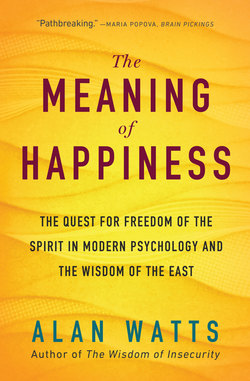Читать книгу The Meaning of Happiness - Alan Watts - Страница 6
На сайте Литреса книга снята с продажи.
ОглавлениеFOREWORD TO THE THIRD EDITION
I was two years old in 1940 when The Meaning of Happiness was originally published. I don’t remember ever reading the book or having a copy of it until just recently. My father, Alan Watts, was all of twenty-four years old when he wrote it, and my mother, Eleanor (his first wife), to whom he dedicated it, was barely twenty. The copy I have now is the second edition, published by James Ladd Delkin in 1953, and, ironically, inscribed to Alan’s third wife, Mary Jane, in 1959. I often wondered about the title of the book and whether he developed his theory on happiness to understand the depression and resulting unhappiness Eleanor dealt with throughout her life. He mentioned in his autobiography, In My Own Way, that Eleanor was involved in reading the manuscript and encouraged him to be honest and to really think through what he meant.
Alan, at the time, told his parents he was developing “a philosophy of acceptance” for a new book. The title then became The Anatomy of Acceptance, which the publisher, Harper, changed to The Meaning of Happiness. Reading it, I’ve tried to wrap my head around the fact that this man understood what he did about the human condition at the young age of twenty-four. He looks at happiness from every possible angle. His initial premise for the book was to address the question, “What do Eastern and Western psychology, taken together, have to say about the elusive and pressing subject of human happiness?” The concept of duality, a common theme in his writings, emerges here with the thesis that in order to experience happiness, one must suffer sadness and that such opposites eventually become complementary.
Alan wrote in a letter to his parents in June 1940, just two months after the book came out, “When I finished that book, I thought it reasonably free from inadequacies, but now, each week shows me another hole in it. There are things left unsaid and I say to myself, ‘There are more things in heaven and earth than are dreamed of in your philosophy.’”
At the time he wrote this book, Alan admits he was somewhat under the influence of Carl Jung, but then notes a sense of inadequacy—that he, Alan, had in fact described a psychological process without any metaphysical foundation. In retrospect, Alan felt that Jung’s refusal to relate his psychology to any one system of metaphysics became his own book’s profound weakness.
Despite all that, my feeling is that The Meaning of Happiness is as timely in its philosophical premise as it was nearly eighty years ago. I leave subsequent interpretation to the reader.
Joan Watts
Livingston, Montana
June 2018
